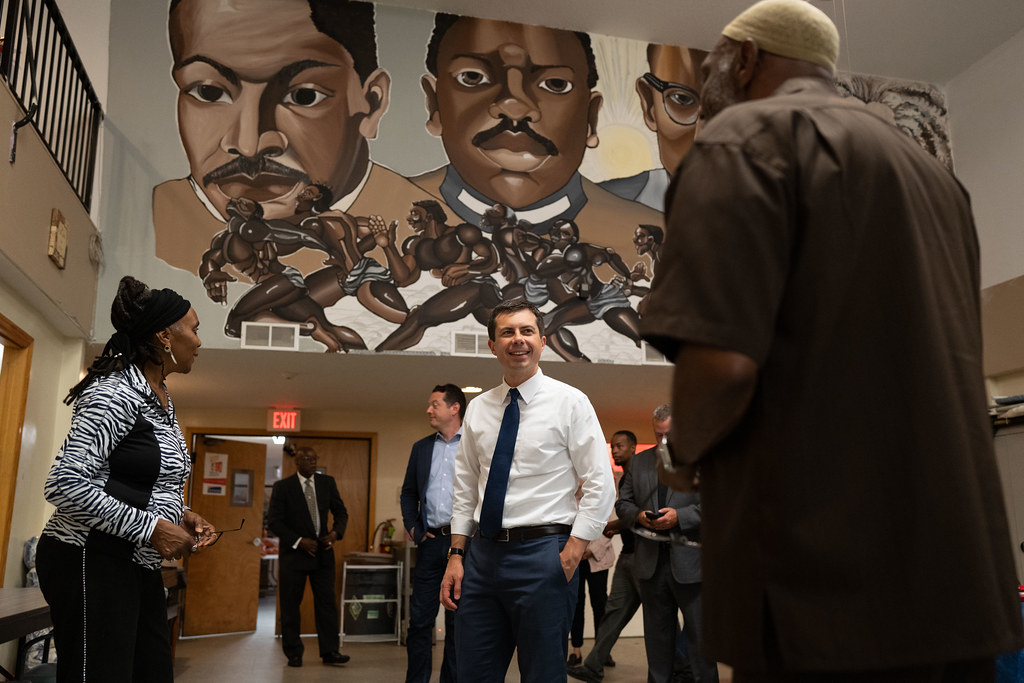Pete Buttigieg’s Bold Ideas?
By Jonah Rosenbaum
Associate Editor, Vol. 25
As Pete Buttigieg surged into being a serious contender for the Democratic nomination, aided in part by a not so subtle push from a fawning media, a less flattering narrative has emerged—the white, small town Mayor of South Bend, Indiana has a race problem. A recent South Carolina poll revealed that Mayor Pete has attracted the support of 0% of black voters.

Mayor Pete Buttigieg tours Creative Visions in Des Moines, Iowa.
Now there are some possible explanations for this. It likely didn’t help that the McKinsey alum fired a popular black police chief for dubious reasons that led to a successful racial discrimination suit. Maybe it’s because his freshly released “Douglass Plan: A Comprehensive Investment in the Empowerment of Black America” sought to empower Black America through (1) the use of a stock photo of a woman from Kenya and (2) the alleged endorsement of black leaders who have made it explicitly clear that they do not support the plan or the man. Maybe it’s because videos have leaked of Mayor Pete cozying up with the Tea Party. Or maybe it’s because black voters bristled at senior campaign advisor Lis Smith’s suggestion that they simply refuse to support a gay man.
Despite the many potentially satisfactory explanations, Buttigieg’s base has expressed confusion at their candidates’ inability to attract black supporters. As one supporter said to Buzzfeed news, “He wouldn’t project that black lives don’t matter. To him, all lives matter.”
Hidden beneath the distracting insanity of that quote is actually the core thesis of Buttigieg’s campaign: his pursuit of a more diverse body of support will always be subservient to his contrived definition of unity. At a demonstration after a South Bend police officer shot and killed an unarmed black man, a protester told Buttigieg “You [are] running for president and you want black people to vote for you. That’s not going to happen.” The consultant/mayor calmly replied, “I’m not asking for your vote.” To quote what we can only assume was one of Pete Buttigieg’s least favorite authors, “When someone shows you who they are, believe them the first time.”
Pete Buttigieg has shown us who he is: when he says he’s not asking for black votes…he means it. If we ignore the contradictions inherent in a man whose personal vision has no qualms about a jump from South Bend to the White House but whose political vision considers the transition from Obamacare to Medicare-for-All beyond the scope of plausible policy, we can for a moment accept the stated premise of his campaign. Indeed, many of his bold ideas are in indeed premised on ability to unify the country. Buttigieg lectured the NYT Editorial Board on this very notion, explaining that “We need to have enough clarity of vision that we can see the boldness of an idea is not measured only by how many people it can alienate, but by what it can get done.” Pete would be hard-pressed to name a bold idea that changed this country (for better or for worse) that didn’t alienate a lot of people!
This is acutely true of reforms involving race. The idea that bold ideas addressing just about any of the issues that lie at the intersection of race and politics—criminal justice reform, educational inequities, healthcare—can be advanced without angering a lot of people is unserious. Colin Kapernick silently took a knee and remains a free agent, so it’s fair to speculate that, say, reshaping our carceral state would probably make people mad. Someone who self-champions as a progressive leader worthy of the presidency at just 38 years of age should not be turned away from doing what is right by the prospect of that anger.
